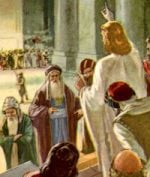Pope Leo XIII: inequality is a fundamental law of nature
By Thomas V. Mirus ( bio - articles - email ) | May 28, 2025
In the course of preparing a series of articles and podcasts surveying the magisterium of Pope Leo XIII, I read the Catholic philosopher Etienne Gilson’s introduction to a 1954 collection of Leo’s greatest social encyclicals. In the introduction, Gilson highlights some themes which modern people might find particularly challenging. The following from Gilson was too good not to post (I have added some extra paragraph breaks for legibility):
“From the point of view of social and political problems, one of the most striking characters of created nature is the fact that natural beings are unequal in perfection and, consequently, distributed according to a hierarchical order of dignity, of power, and, therefore, of authority. Expressed in terms both simpler and less palatable to the modem mind, this means that one of the most fundamental laws of nature is unequality.
“Stones are less perfect than plants, plants are less perfect than brutes, brutes are less perfect than man, who exists as the stones, lives as the plants, feels as the brutes, and, moreover, exercises intellectual knowledge owing to his intellect. Even within the human species itself, individuals are unequal both physically and intellectually. These inequalities in perfection entail, as their necessary consequences, other inequalities in power and in authority.
“Since this is the way the world has been created by God, it is how it should be, and any attempt on the part of man to subvert the natural order of the created universe can only result in catastrophes. It is one of the most constant teachings of Pope Leo XIII that to deny the natural laws which govern societies is to court disaster. The ceaseless revolutions which threaten modern societies are a clear sign of the peril there is in overlooking the natural order created by God.
“The same truth could be expressed differently in saying that overlooking the sacred character of the law of nature is one of the main sources of the evils that threaten modem societies. A striking illustration of this doctrine is found in the first encyclical of Leo XIII, Quod Apostolici Muneris (December 28, 1878). Speaking of the domestic authority of husband over wife, of parents over children, or of masters over servants, the Pope says that it not only takes its origin and force from God, but also derives from Him ‘its nature and character’ (‘sed etiam naturam et indolem,’ A.S.S., 11, 374). The very authority of the Heavenly Father and Lord of all ‘flows in the parents and in the masters’; how, then, could it lose a character which it holds from its divine origin?
“All the modern slogans proclaiming the natural, social, and political equality of all men are irrelevant to the problem. God could have created nature other than it is, but the only question is: Are men naturally equal or not? If they are not, then all the inequalities in wealth, in economic power, and in political power necessarily follow from the natural inequalities first created by God and willed by Him.
“To rebel against the order of nature is not a way to change it. To deny that things are such as they are is not likely to modify their natures. Were he with us still today, Pope Leo XIII would probably observe that the political regime which has made the strongest bid for the sup-pression of all social classes, for absolute equality in all domains, and, finally, for the restoration of a society free from all political rulers has brought about the worst social, economic, and political tyranny which the modern world has ever known.”
Further on, Gilson writes:
“The famous encyclical Rerum Novarum can be considered the best effort of Pope Leo XIII to indicate to the Catholics of the world the absolute necessity there is for men to take into account human nature such as it actually is before undertaking any reformation of the social and political order. Faithful to his principle that inequality is a fact of nature and that natural inequality necessarily begets social inequality, Leo XIII inculcates in all possible ways to the rulers of the various nations of the world, whatever the political regime of their countries may possibly happen to be, that the only wise governance does not consist in dealing with men and classes as though they were equal, but in devoting to all of them equal care in spite of their factual inequality. The wisdom of this golden rule may not be immediately evident, but it will become more and more clear as the reader becomes more familiar with the teaching of Pope Leo XIII, that is, with the principles of the Christian philosophy of Thomas Aquinas.”
All comments are moderated. To lighten our editing burden, only current donors are allowed to Sound Off. If you are a current donor, log in to see the comment form; otherwise please support our work, and Sound Off!





